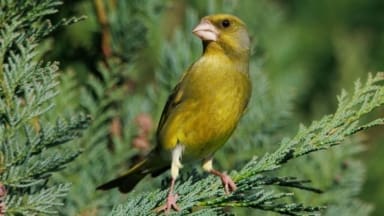
In a statement to customers, the Royal Society for the Protection of Birds (RSPB) has indicated that feeding birds from flat surfaces, such as bird tables, could be linked to the transmission of illnesses such as finch trichomonosis. The charity has therefore removed flat bird feeders and related products (Table mix and Table mix extra, window feeders and feeder guardians with trays) from its website, following information that may contribute to the spread of fatal diseases among UK birds – in particular, finches.
Trichomonosis is a fatal disease and the cause of the rapid decline of the British Greenfinch population and poses a serious threat to other, beloved garden birds. To highlight the devastating impact of this fatal disease on finches, garden birds and our role in its transmission, we published two in-depth reports last year; ‘Trichomonosis: Fatal disease causing rapid decline of our greenfinches‘ and ‘Trichomonosis: Are our bird feeders up to scratch?‘ On reading our reports, Dick Woods, founder of Finches Friends, said “Literally no one has published anything as comprehensive as this in the UK.”
In a message to customers, the RSPB stated:
“We know so many of you love feeding your garden birds and some bird species really do benefit from us putting out extra food for them, especially in winter. However, there is increasing evidence that for other birds there can also be negative effects such as the spread of disease, especially among finches.
“We want to make bird feeding as safe as possible, so we’re reviewing the advice we give you and products we sell based on the latest science.
“As a precautionary measure, whilst we await the findings of the review, we have suspended all our bird tables and related products, Table mix and Table mix extra, window feeders and feeder guardians with trays, from sale. This is because there is evidence to suggest that some birds, particularly finches, can be more exposed to disease when fed on flat surfaces like these.
“As the country’s largest nature conservation charity we want to be transparent with our supporters and customers. We believe suspending the products until we have a better understanding of how the disease spreads is our best option to ensure the safety of birds.”
According to the 2021 UK Breeding Bird Survey, greenfinch populations have declined from circa 4.3 million to approximately 1 million birds, which equates to an overall decline of 77%. Whilst greenfinch and chaffinch are the most frequently affected by trichomonosis, many other garden bird species, such as the house sparrow, siskin, goldfinch and bullfinch are also susceptible.
Researchers believe that the likely mode of infection transmission occurs when birds share regurgitated food through food and water contaminated with saliva. Bird feeders where birds are able to sit in, walk on the seeds, or allow access by larger birds such as pigeons or doves, adds to the risk of (faecal) contamination – risking further spread of this (and other) infectious disease.

